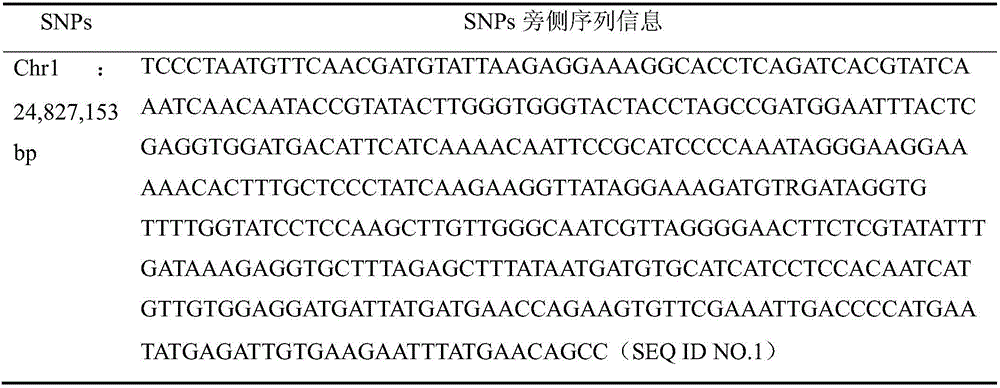Single nucleotide polymorphism marker site, primers and reagent kit for identifying peach fruit flesh color characteristic and application
A single nucleotide polymorphism and marker site technology, which is applied in the determination/inspection of microorganisms, biochemical equipment and methods, DNA/RNA fragments, etc. Point, positioning distance and other problems, to achieve high accuracy
- Summary
- Abstract
- Description
- Claims
- Application Information
AI Technical Summary
Problems solved by technology
Method used
Image
Examples
Embodiment 1
[0026] Example 1 Obtaining of SNPs marker sites
[0027] In the present invention, 129 peach germplasms randomly obtained from the peach germplasm resource garden of Zhengzhou Institute of Pomology, Chinese Academy of Agricultural Sciences were used as samples, and the sample DNA was extracted by conventional CTAB method, and the 129 peach germplasms were reconstructed by Illumina HiSeq 2000 sequencer. Sequencing obtained 121Gb data, covering an average of 89.28% of the peach genome, and the average sequencing depth was about 4.21×. According to the 50-150bp reads obtained by sequencing, it is compatible with the peach reference genome v.1.0 ( http: / / www.rosaceae.org / node / 355 ) were compared, and 4,063,377 SNPs were identified. Using these SNPs to conduct genome-wide association analysis on the phenotypic traits of 129 germplasms, it was identified that the SNPs that were significantly associated with peach fruit flesh color were located at 24827153 bp of chromosome 1.
Embodiment 2
[0028] Embodiment 2 Utilizes the method for identifying peach fruit flesh color (white / yellow) traits with SNP markers
[0029] 1. DNA extraction
[0030] The DNA of the peach sample tissue to be tested was extracted by the conventional CTAB method, and the RNA was removed. The total volume of the DNA sample was not less than 15 μl. Measure the OD value of the DNA sample at 260nm and 280nm with a UV photometer, and calculate the DNA content and OD 260 / 280 ratio. DNA sample purity OD 260 / 280 The value should be between 1.8-2.0 and the concentration should be diluted to 10ng / μl.
[0031] 2. Design primers
[0032] Primers were designed according to the 200 bp sequences on the left and right of the 24827153rd position of the first chromosome of the peach genome (see Table 1 for the specific nucleotide sequence).
[0033] Table 1 SNPs flanking sequence information
[0034]
[0035] Among them, R represents A or G.
[0036] After the primers were synthesized by the biotec...
Embodiment 3
[0063] Example 3 Blind test verification of phenotypic traits in 15 hybrid populations using fruit flesh color-associated SNP markers
[0064] 1. Selection of experimental materials
[0065] Taking the conventional peach varieties planted in the resource garden of Zhengzhou Pomology Research Institute as experimental materials, 15 hybrid populations with investigated phenotypic traits were selected from which a total of 221 individual plants were selected. See Table 6 for details.
[0066] Table 6 The name and population size information of the tested hybrid population
[0067]
[0068]
[0069] 2. Identification method using fruit flesh color-associated SNP markers
[0070] Using the 24827153rd position of the first chromosome of the peach genome of the present invention as the nucleotide polymorphism marker site, a total of 221 peach individual plant fruit flesh colors of 15 hybrid populations were blindly tested and identified. For the specific identification method,...
PUM
 Login to View More
Login to View More Abstract
Description
Claims
Application Information
 Login to View More
Login to View More - R&D
- Intellectual Property
- Life Sciences
- Materials
- Tech Scout
- Unparalleled Data Quality
- Higher Quality Content
- 60% Fewer Hallucinations
Browse by: Latest US Patents, China's latest patents, Technical Efficacy Thesaurus, Application Domain, Technology Topic, Popular Technical Reports.
© 2025 PatSnap. All rights reserved.Legal|Privacy policy|Modern Slavery Act Transparency Statement|Sitemap|About US| Contact US: help@patsnap.com



